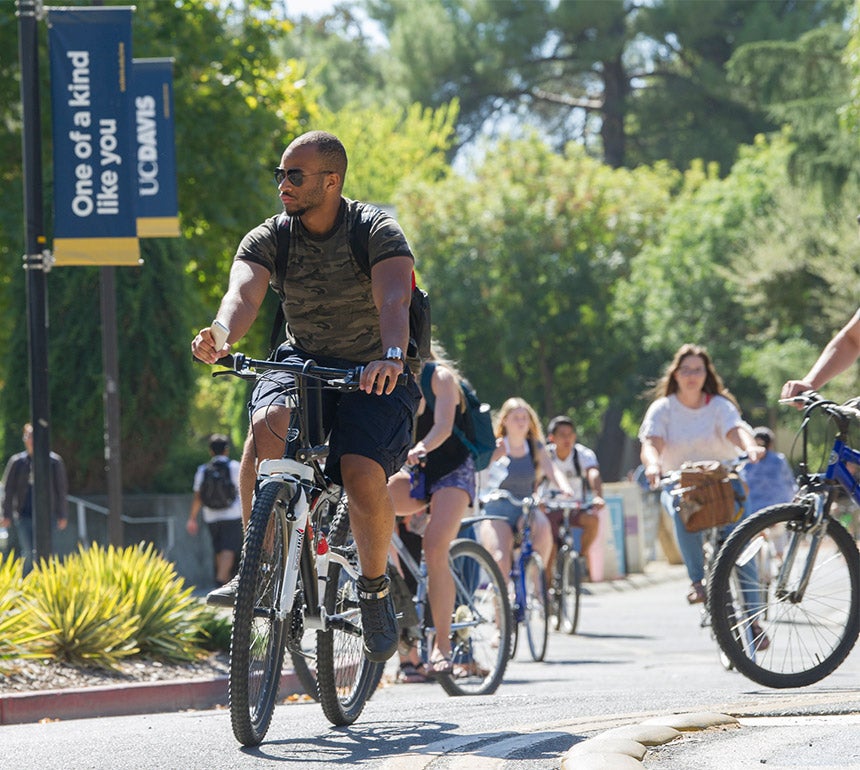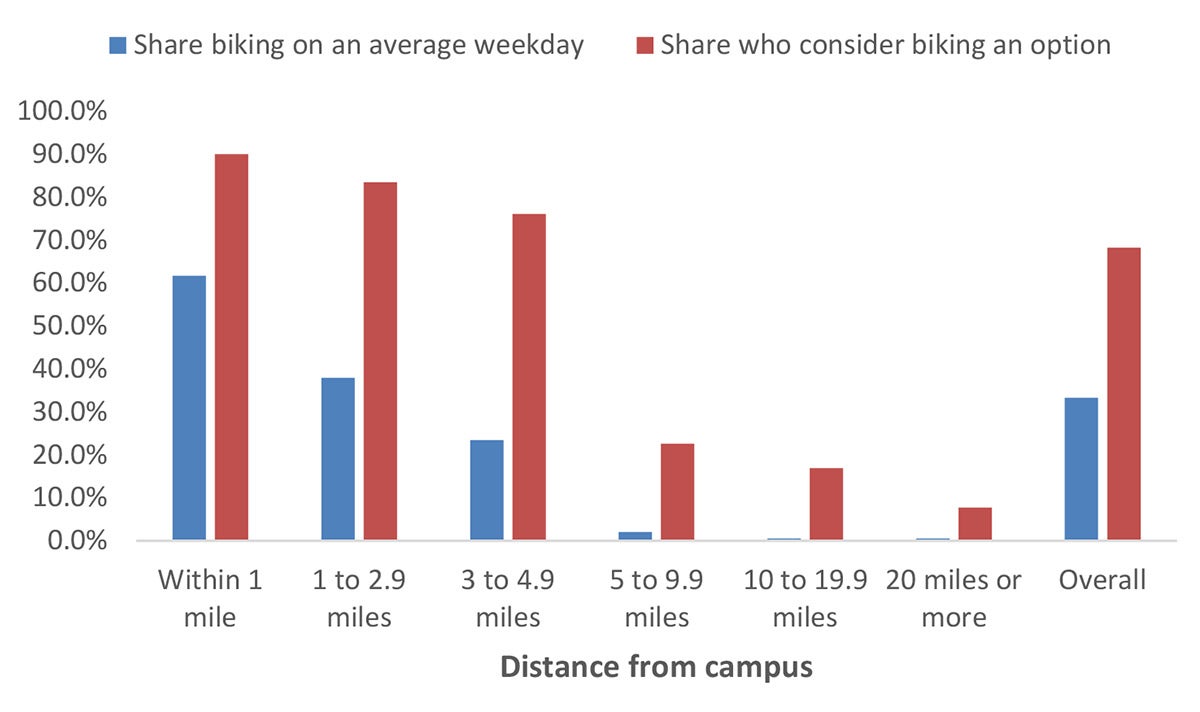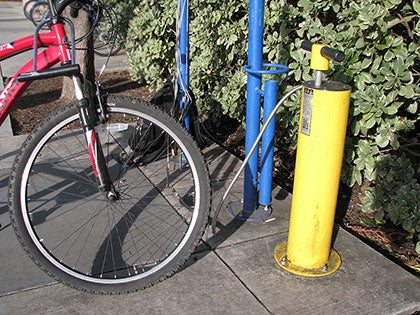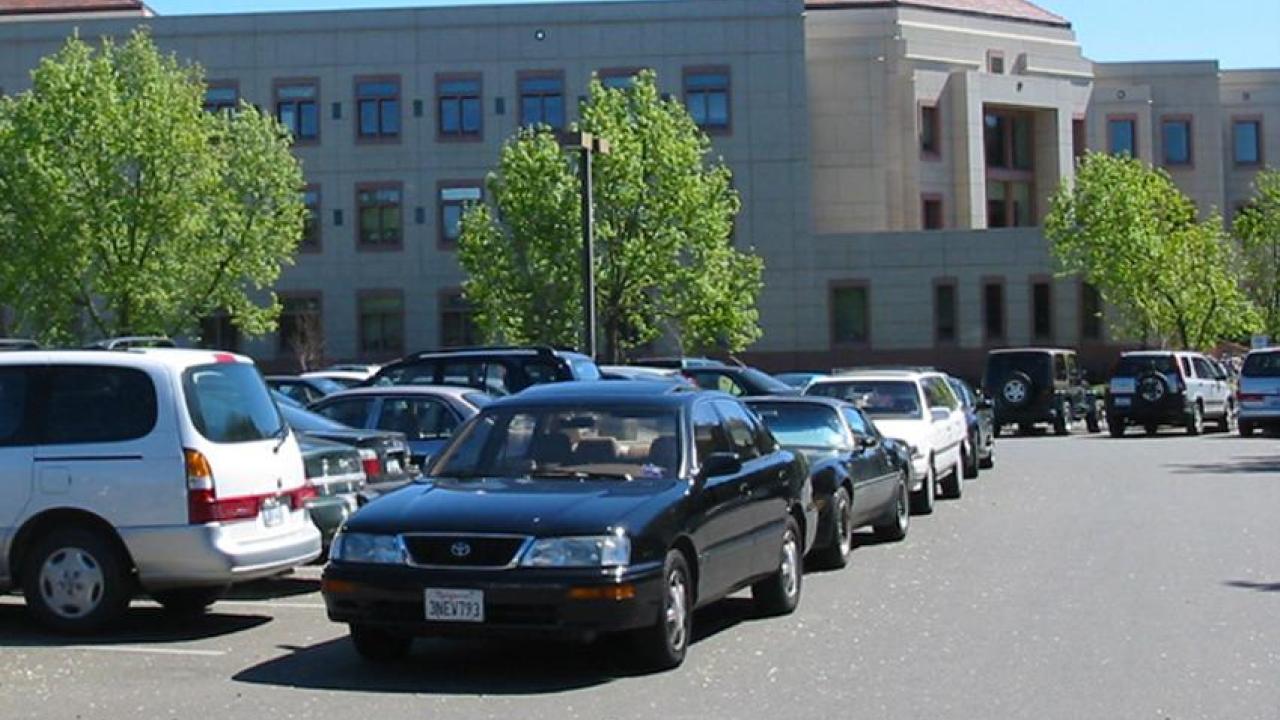The longer your commute to campus, the more likely you are to drive it alone. That’s what researchers have long found with the annual Campus Travel Survey, and that’s what Transportation Services is hoping to find ways to counteract.
“How can we reduce barriers to more sustainable commuting?” asked Eleni Jacobson, who is working on Transportation Services’ “Transportation Tomorrow” initiative to reduce the number of single-occupancy vehicle trips to campus by 10 percent by the year 2027.

According to data from the 2016-17 Campus Travel Survey, a collaborative effort between the Institute for Transportation Studies and Transportation Services, those who live outside of Davis are five times more likely to drive alone each day. In fact, solo drivers travel a collective 300,000 miles — greater than the distance between the Earth and the Moon — in their trips to and from campus each day.
“The goal of this important campus effort is to provide our community a variety of ways to commute to the campus that are accessible, flexible, convenient, reliable, affordable and healthy,” said Transportation Services Director Cliff Contreras. “We will, with the valuable assistance of our community, expand our suite of already successful transportation options by further encouraging and rewarding sustainable commute options that reduce our dependency on drive-alone modes of travel.”
One seemingly simple way for Sacramento residents to get across the Causeway is the shuttle between the main campus and UC Davis Health, which runs hourly for a $1.50 fare. But ridership has been falling in recent years, and Transportation Services student employees will soon ride along with surveys in hand to try to determine why.
“It seems natural to see if we can expand (the intercampus shuttle),” said Anthony Palmere, who last year retired as general manager of Unitrans and is now working with Transportation Services on the Transportation Tomorrow plan.
IN THE MEANTIME: STACK PARKING
Transportation Services has implemented stack parking to fit more cars into existing facilities. The valetlike service is in use at the Quad Parking Structure, and lots 25 and 47. More information is available on Transportation Services' FAQ page.
Carpools and vanpools — currently used by 12 percent of people, according to the survey — could be more low-hanging fruit for reducing the number of cars that come to campus each day. That’s an important goal for Transportation Services, which is hoping to avoid building another parking structure on campus. For one, a parking structure is inherently expensive (Transportation Services spent $59 million to build the three parking structures on campus, related road and path improvements and the Transportation Services office building), but the rise in self-driving cars could mean that far fewer parking spaces are needed on campus in the future. It would be even more costly to build a parking structure that could one day be converted into an office building.
Recently Sacramento Mayor Darrell Steinberg got imaginations flowing with the suggestion that a fleet of electric buses crossing the Causeway could be an additional cog in the city’s plan to increase adoption of zero-emission vehicles in the region. Transportation Services is currently discussing that idea with SACOG, the Sacramento Area Council of Governments.
Transportation between Davis and Sacramento is likely to become an even hotter topic once a site is chosen for “Aggie Square,” the regional innovation center proposed by Chancellor Gary S. May and Steinberg.
Contreras knows more bus routes around the region are likely to lead to more ridership, and hopes to convince YoloBus, Sacramento Regional Transit and others to run more trips to campus.

For now, Transportation Services is exploring other ways to convince faculty, staff and students to choose nondriving commutes. When freshmen gather to learn about off-campus housing options for next year, Jacobson is there with Transportation Demand and Marketing Coordinator Ramon Zavala to encourage them to try going without a car for a quarter to see how easy it is. And they have data to back that up — around 80 percent of Campus Travel Survey respondents consider bicycling a reasonable option when they live within five miles of campus.
Overall, the Campus Travel Survey showed 37 percent of students, faculty and staff use a bike as their main mode of transportation to campus. That number had been higher in previous surveys, but researchers found they were overestimating the number of faculty members and underestimating the number of staff among people who took the survey.
“Because faculty and staff travel so differently, that had a big impact on the estimates of travel modes,” said Susan Handy, a professor of environmental science and policy and the director of the National Center for Sustainable Transportation. She oversees the graduate students who conduct the survey.

The next version of the survey will ask additional questions about electric-assist bicycles.
“That’s one thing we’ll be looking at this spring,” Handy said. “For people who live in Davis but drive to campus, maybe an electric-assist bicycle could be a way to get them out of their cars.”
The campus will have a chance to try them out with a bicycle-share program launching in May. Members will be able to check out electric bicycles around campus.
The researchers conducting the Campus Travel Survey aren’t the only ones asking questions.
Transportation Services has a week of Transportation Tomorrow outreach planned in May — coinciding with the Thank Goodness for Staff Picnic — where staff members will be tabling and asking faculty and staff how they might be persuaded to forgo buying parking passes.
And, as of now, all options are on the table.
